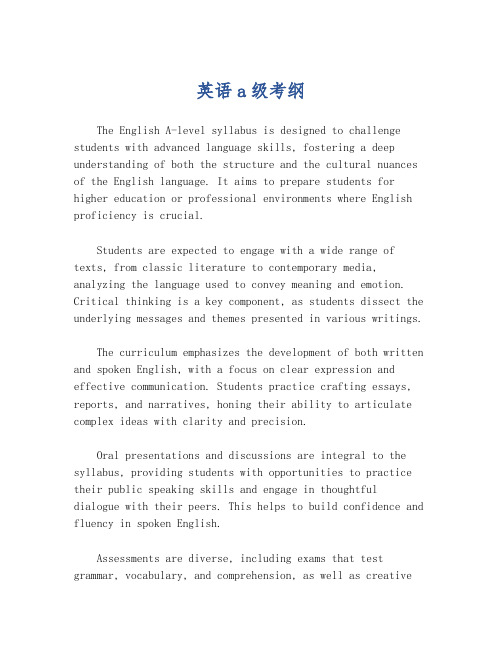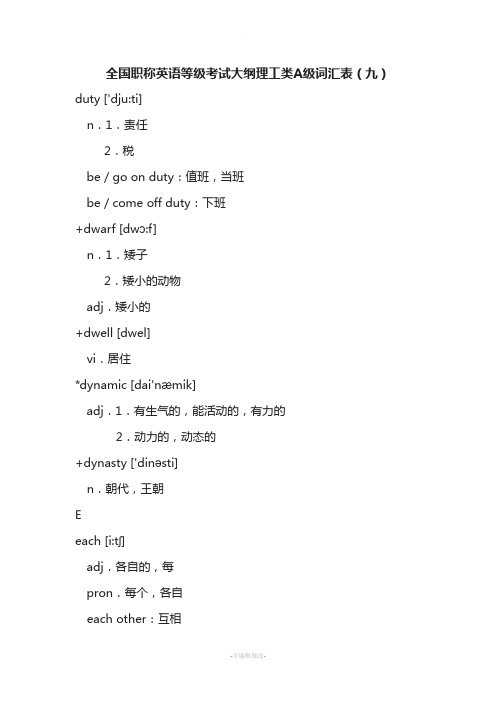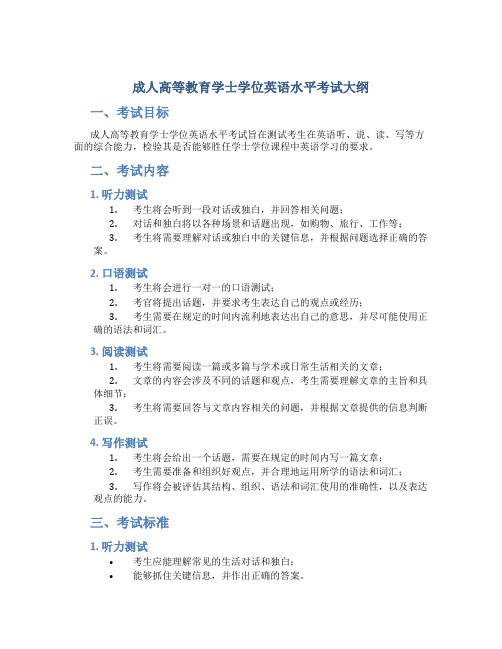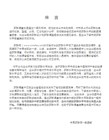英语A级考试大纲
英语a级考纲

英语a级考纲The English A-level syllabus is designed to challenge students with advanced language skills, fostering a deep understanding of both the structure and the cultural nuances of the English language. It aims to prepare students for higher education or professional environments where English proficiency is crucial.Students are expected to engage with a wide range of texts, from classic literature to contemporary media, analyzing the language used to convey meaning and emotion. Critical thinking is a key component, as students dissect the underlying messages and themes presented in various writings.The curriculum emphasizes the development of both written and spoken English, with a focus on clear expression and effective communication. Students practice crafting essays, reports, and narratives, honing their ability to articulate complex ideas with clarity and precision.Oral presentations and discussions are integral to the syllabus, providing students with opportunities to practice their public speaking skills and engage in thoughtful dialogue with their peers. This helps to build confidence and fluency in spoken English.Assessments are diverse, including exams that test grammar, vocabulary, and comprehension, as well as creativewriting tasks that allow students to demonstrate their originality and command of the language.The syllabus also incorporates the study of language acquisition, exploring how learners develop English skills and the various methods and strategies that can facilitate this process. This knowledge is invaluable for those considering a career in education or translation.Finally, the English A-level encourages students to become independent learners, equipping them with the research skills necessary to explore topics of interest and to continue their language studies beyond the classroom.。
全国职称英语等级考试大纲理工类A级词汇表汇总

全国职称英语等级考试大纲理工类A级词汇表(九)duty ['dju:ti]n.1.责任2.税be/go on duty:值班,当班be/come off duty:下班+dwarf [dwɔ:f]n.1.矮子2.矮小的动物adj.矮小的+dwell [dwel]vi.居住*dynamic [dai'næmik]adj.1.有生气的,能活动的,有力的2.动力的,动态的+dynasty ['dinəsti]n.朝代,王朝Eeach [i:tʃ]adj.各自的,每pron.每个,各自each other:互相eager ['i:gə]adj.热切的,渴望的eagle ['i:gəl]n.鹰ear [iə]n.1.耳朵2.听觉,听力earl [ə:l]n.伯爵early ['ə:li]adv./adj.早(的),早期(的),在初期(的) earn [ə:n]vt.挣得,获得earn one's living:谋生,挣钱+earnest ['ə:nist]n./adj.认真(的),诚挚(的)earnings ['ə:niŋz]n.收入earth [ə:θ]n.1.地球2.土地,陆地3.土,泥on earth:究竟,到底earthquake ['ə:θkweik]n.地震ease [i:z]n.1.容易2.自在,舒适,安逸v.缓和,减轻easily ['i:zili]adv.1.容易地2.顺利地east [i:st]n./adj.东方(的),东部(的) adv.向东方Easter ['i:stə]n.复活节eastern ['i:stən]adj.东方的,东部的easy ['i:zi]adj.1.容易的2.舒适的,安逸的take it easy:别着急,慢慢来eat [i:t]v.吃+eccentric [ik'sentrik]adj./n.1.古怪的(人)2.(圆等)不同圆心的*echo ['ekəu]n./v.1.回声,回波2.共鸣+eclipse [i'klips]n.日(月)蚀+ecology [i'kɔlədʒi]n.生态学economic [,i:kə'nɔmik] adj.经济学的,经济(上)的economical [i:kə'nɔmikəl] adj.节约的,节省的economics [i:kə'nɔmiks]n.经济学economy [i'kɔnəmi] n.1.经济2.节约edge [edʒ]n.1.边,边缘2.刀口,刃+edible ['edibəl]adj.可以吃的,食用的edit ['edit]vt.编辑edition [i'diʃən]n.版,版本editor ['editə]n.1.编辑,编者2.编辑器editorial [edi'tɔ:riəl]n.社论educate ['edjukeit]vt.教育,培养,训练education [edju'keiʃən]n.教育,培养,训练effect [i'fekt]n.1.结果2.效果,作用bring/come/go/put/take into effect:使生效;起作用vt.产生,招致,完成effective [i'fektiv]adj.有效的,卓有成效的efficiency [i'fiʃənsi] n.1.功效2.效率efficient [i'fiʃənt] adj.效率高的,有能力的effort ['efət]n.努力,尝试e.g.=for example例如egg [eg]n.蛋,卵,鸡蛋Egypt ['i:dʒipt]n.埃及eight [eit]num.八(个) eighteen [ei'ti:n; 'eiti:n] num.十八eighth [eitθ]num.第八eighty ['eiti]num.八十either ['aiðə; 'i: ðə]pron.(两者中)任何一个adv.[与not连用]也(不),而且conj.(either…or…)或…或…,不是…是…+elaborate [i'læbərət]vt.1.详细说明,阐述2.精心制作adj.详尽的,复杂的,精心制作的+elastic [i'læstik]n.松紧带,橡皮圈adj.1.灵活的2.有弹性的*elbow ['elbəu]n.肘v.用肘推,挤进elderly ['eldəli]adj.上了年纪的,垂老的elect [i'lekt]v.选举election [i'lekʃən]n.选举electric [i'lektrik]adj.电的,电动的,导电的electrical [i'lektrikəl]adj.与电有关的,电气的,用电的electricity [,ilek'trisiti]n.电+electron [i'lektrɔn]n.电子electronic [ilek'trɔnik]adj.电子(学)的elegant ['eligənt]adj.优雅的,高雅的,漂亮的element ['elimənt]n.1.成分,要素2.元素elementary [eli'mentəri] adj.1.简单的,容易的2.初级的,基础的elephant ['elifənt]n.大象+elevate ['eliveit]vt.1.举起,抬高2.提升*elevator ['eliveitə]n.电梯,升降机eleven [i'levən]num.十一+eligible ['elidʒibəl]adj.1.有资格的2.合格的,适宜的eliminate [i'limineit]vt.消灭,除去,排出+elite [ei'li:t; i'li:t]n.精英,精华+ellipse [i'lips]n.椭圆,椭圆形+eloquent ['eləkwənt]adj.雄辩的,有口才的,有说服力的else [els]adv./adj.其他(的),另外(的)or else:否则,要不然elsewhere [,els'wεə; 'elswεə] adv.在别处,到别处*e-mailn.电子邮件+emancipate [i'mænsipeit] vt.解放,(使)不受束缚*embargo [em'bɑ:gəu; im'bɑ:gəu] vt.禁止(船舶进入港口或贸易) n.1.封港令2.禁止贸易令3.禁令*embark [im'bɑ:k]v.乘船,上船,搭载embarrass [im'bærəs]vt.使窘迫,使为难embassy ['embəsi]n.大使馆,大使馆全体工作人员+embody [im'bɔdi]vt.1.表达,体现2.包含,包括embrace [im'breis]v./n.1.拥抱2.包含+embroidery [im'brɔidəri] n.刺绣emerge [i'mə:dʒ]vi.1.出现,浮出2.(问题)冒出,(事实)暴露emergency [i'mə:dʒənsi]n.突发事件,紧急情况*emigrate ['emigreit]vi.移居外国,移民*emission [i'miʃən]n.1.散发,发射2.发出物,发射物+emit [i'mit]vt.出(声),放(光等),放射(热等) emotion [i'məuʃən]n.1.情感2.激动,激情emperor ['empərə]n.皇帝emphasis ['emfəsis]n.加强语气,强调,重点emphasize ['emfəsaiz]vt.加强…的语气,强调,着重empire ['empaiə]n.帝国+empirical [em'pirikəl] adj.经验主义的employ [im'plɔi]vt./n.1.使用2.雇用employee [,emplɔi'i:; em'plɔii:] n.受雇者,雇员employer [im'plɔiə]n.雇用者,雇主employment [im'plɔimənt] n.1.使用2.雇用3.工作empress ['empris]n.女皇,皇后empty ['empti]adj.1.空的2.空虚的,空洞的vt.弄空,倒空enable [in'eibəl]vt.使能够,使可能enclose [in'kləuz]vt.1.围住,圈起2.封人,附上+encode [in'kəud; en'kəud]vt.编码encounter [in'kauntə]v./n.遭遇,遇见encourage [in'kʌridʒ]vt.鼓励,激励,支持*encyclop(a)edia [en,saikləu'pi:djə]n.百科全书end [end]n.1.端,尖,终点2.目的,目标in the end:终于,最后put an end to:了结,停止v.终止,结束end up with:以(某种身份、状态、境况)结束*endanger [in'deindʒə]vt.危及,危害+endeavo(u)r [in'devə]vi./n.努力,尽力+endorse [in'dɔ:s]vt.1.背书;签署(姓名)2.赞同;批准+endow [in'dau]vt.1.捐赠,资助2.赋予+endurance [in'djuərəns] n.1.忍耐(力)2.持久性endure [in'djuə]v.忍受,忍耐enemy ['enəmi]n.1.敌人,敌军,仇人2.危害物+energetic [,enə'dʒetik] adj.精神饱满的,精力充沛的energy ['enədʒi]n.1.精力,活力2.能,能量enforce [in'fɔ:s]vt.1.强制,强迫2.实施,执行engage [in'geidʒ]vt.1.使从事于,使忙于2.占用(时间)3.雇用,聘用4.订婚vi.(in)从事,参加engine ['endʒin] n.1.发动机2.机车,火车头engineer [endʒi'niə] n.工程师,技师engineering [endʒi'niəriŋ] n.工程(学)England ['iŋɡlənd] n.1.英格兰2.(泛指)英国English ['iŋɡliʃ]n./adj.1.英语(的)2.英国人(的) enhance [in'hɑ:ns; in'hæns] vt.提高;增强enjoy [in'dʒɔi]vt.1.享受…之乐,欣赏2.享有enjoyable [in'dʒɔiəbl]adj.愉快的,有趣的enlarge [in'lɑ:dʒ]vt.1.扩大,扩展,扩充2.放大+enlighten [in'laitən]vt.启发,开导enormous [i'nɔ:məs]adj.巨大的,庞大的enough [i'nʌf]adj./adv.充足的(地),足够的(地) n.足够enquire [in'kwaiə]v.1.打听,询问2.调查,查问enrich [in'ritʃ]vt.使富裕,使丰富+enrol(l) [in'rəul]vt.1.登记,编入,使入学2.使入伍ensure [in'ʃɔ:; in'ʃuə]vt.保证,担保,确保+entail [in'teil]vt.蕴涵enter ['entə]v.1.进入2.加入,参加enterprise ['entəpraiz]n.1.企(事)业单位2.事业心,进取心,冒险精神entertain [entə'tein]vt.1.使感兴趣,使娱乐2.招待,款待3.持有(意见、见解等),怀有(疑虑等) enthusiasm [in'θju:ziæzəm]n.热心,热情,积极性enthusiastic [in,θju:zi'æstik]adj.热心的,热烈的entire [in'taiə]adj.全部的,整个的entitle [in'taitl]vt.1.给…题名2.给…权力(资格)+entity ['entiti]n.存在;实体entrance ['entrəns] n.1.入口2.进入,入学+entrust [in'trʌst] vt.1.委托管理2.委托entry ['entri]n.1.进入2.人口,通道3.登记envelope ['envələup] n.信封environment [in'vairənmənt] n.环境,周围状况*envy ['envi]vt./n.妒忌,羡慕+epic ['epik]n.史诗,叙事诗adj.1.史诗般的2.英雄的,壮丽的+epidemic [epi'demik] n.1.流行病,传染病2.(流行病的)蔓延adj.1.传染的2.流行性的+episode ['episəud] n.插曲,片段+epoch ['i:pɔk; 'epək] n.时代,纪元equal ['ikwəl] adj.1.相等的,相同的2.平等的3.胜任的be equal to:1.等于2.胜任3.经得住n.1.地位相等的人2.同辈vt.1.比得上2.等于*equality [i'kwɔliti; i:'kwɔliti] n.1.同等,平等2.等式equally ['i:kwəli] adv.1.同样地,相同程度地2.平等地,均一地+equator [i'kweitə]n.赤道equip [i'kwip]vt.装备,配备be equipped with:装备着equipment [i'kwipmənt] n.设备,器材equity ['ekwiti]n.1.公平,公正2.(pl.)普通股equivalent [i'kwivələnt] adj.1.相等的2.等价的,等量的n.同等物,等价物,对等*era ['iərə; 'εərə]n.纪元,时代,年代*erase [i'reiz]vt.擦掉,抹掉+erect [i'rekt]adj.直立的vt.1.使直立2.建立,安装+erode [i'rəud]v.(受)腐蚀,(受)侵蚀error ['erə]n.差错,误差*erupt [i'rʌpt]v.(火山等)迸发,爆发+escalate ['eskəleit]vi.逐步上升,逐步增强escape [i'skeip]vi.1.逃跑,逃脱,逃避,避免2.(液体等)漏出,漏气vt.1.避开2.漏掉n.逃避+escort ['eskɔ:t]vt.护送,护卫,陪同n.1.警卫,护送者2.仪仗兵especially [i'speʃəli]adv.特别,尤其,格外essay ['esei]n.短文,散文essence ['esəns]n.1.本质,实质2.精华,精粹essential [i'senʃəl]adj.1.根本的,本质的,最重要的2.必要的,必不可少的n.(pl.)本质,要点establish [i'stæbliʃ]vt.1.建立,设立2.确定,使确认3.安顿establishment [i'stæbliʃmənt] n.1.建立2.确定3.建立的机构estate [i'steit]n.财产,房地产esteem [i'sti:m]n./vt.尊重,珍重estimate ['estimeit]vt./n.估计,评价,判断etc.adv.(拉丁语)等等(常读作and so forth) *eternal [i'tə:nəl]adj.永久的,不朽的+ethic(a1) ['eθik(əl)]adj.伦理(等)的,道德的+ethnic ['eθnik]adj.种族的,人种的Europe ['juərəp]n.欧洲European [juərə'pi:ən]adj.欧洲的n.欧洲人+evacuate [i'vækjueit]v.疏散,撤走evaluate [i'væljueit]vt.评价,评估+evaporate [i'væpəreit]v.(使)蒸发,(使)挥发eve [i:v]n.前夕,前夜even ['i:vən]adj.1.平坦的,平稳的,有规律的2.对等的,均等的3.偶数的adv.甚至,更加evening ['i:vniŋ]n.傍晚,晚上event [i'vent]n.事件,大事eventually [i'ventʃuəli]adv.最后,终于ever ['evə]adv.1.总是2.在任何时候3.究竟*evergreen ['evəgri:n]adj.常绿的n.常绿植物every ['evri]adj.每,每个,每隔…的everybody ['evribɔdi] pron.每人,人人,各人everyday ['evribɔdi]adj.每天的,日常的everyone =everybody everything ['evriθiŋ] pron.一切,每件事,凡事everywhere ['evriwεə] adv.处处,无论何处evidence ['evidəns]n.1.根据,证据2.迹象evident ['evidənt]adj.明白的,明显的evil ['i:vəl]n.1.邪恶,弊病2.祸害adj.1.邪恶的2.坏的+evoke [i'vəuk]vt.引起,唤起*evolution [,i:və'lu:ʃən; 'ev'lu:ʃən]n.1.进化,演化2.发展,演变evolve [i'vɔlv]v.(使)发展,(使)进化exact [ig'zækt]adj.确切的,精确的exactly [ig'zæktli]adv.1.正确地,精确地2.恰好地,正好地3.正是,一点不错*exaggerate [ig'zædʒəreit]v.夸张,夸大exam [ig'zæm] =examination [ig,zæmi'neiʃən] n.1.考试2.检查examine [ig'zæmin]vt.1.检查,仔细看2.询问,对…进行考试example [ig'zɑ:mpl]n.例子,例证,范例,榜样for example:例如+excavate ['ekskəveit]v.凿,挖掘exceed [ik'si:d]v.超过(限度、范围),比…大,胜过excellent ['eksələnt]adj.优秀的,杰出的except [ik'sept]prep.除…以外except for:除…以外,只有exception [ik'sepʃən]n.例外,除外with the exception of:除…外exceptional [ik'sepʃənəl] adj.1.例外的,特别的,异常的2.非常优秀的,卓越的*excess [ik'ses; ek'ses; 'ekses] n.超越,超过,超额量adj.过量的,额外的,附加的exchange [iks'tʃeindʒ]v./n.兑换,调换,交换excite [ik'sait]vt.1.(使)激动2.激发excited [ik'saitid]adj.激动的excitement [ik'saitmənt]n.刺激,兴奋(状态)exciting [ik'saitiŋ]adj.令人兴奋的,使人激动的+exclaim [ik'skleim]v.惊叫,呼喊,大声地说exclude [ik'sklu:d]vt.把…除外,排斥*exclusive [ik'sklu:siv] adj.1.排外的,排斥的2.独占的,专有的,排他的excuse [ik'skju:z]vt.1.原谅,宽恕2.免除(某人的)责任n.借口,理由execute ['eksikju:t]vt.1.处决2.实施,执行executive [ig'zekjutiv]adj.实行的,行政的n.1.行政部门2.行政官,执行者+exempt [ig'zempt]vt.(from)赦免,免除adj.被豁免的,被免除的exercise ['eksəsaiz]n.1.锻炼,训练,运动2.练习,习题3.(权力)行使,(能力)运用vi.锻炼,训练,运动vt.行使(权力),运用(能力)+exert [ig'zə:t]vt.1.尽(力)2.施加,运用exhaust [ig'zɔ:st]vt.1.耗尽(资源等),详尽处理2.使精疲力尽n.1.排气装置2.废气exhaustive [ig'zɔ:stiv]adj.彻底的,完全的;使(资源、力量)等枯竭的THANKS !!!致力为企业和个人提供合同协议,策划案计划书,学习课件等等打造全网一站式需求欢迎您的下载,资料仅供参考。
成人高等教育学士学位英语水平考试大纲

成人高等教育学士学位英语水平考试大纲一、考试目标成人高等教育学士学位英语水平考试旨在测试考生在英语听、说、读、写等方面的综合能力,检验其是否能够胜任学士学位课程中英语学习的要求。
二、考试内容1. 听力测试1.考生将会听到一段对话或独白,并回答相关问题;2.对话和独白将以各种场景和话题出现,如购物、旅行、工作等;3.考生将需要理解对话或独白中的关键信息,并根据问题选择正确的答案。
2. 口语测试1.考生将会进行一对一的口语测试;2.考官将提出话题,并要求考生表达自己的观点或经历;3.考生需要在规定的时间内流利地表达出自己的意思,并尽可能使用正确的语法和词汇。
3. 阅读测试1.考生将需要阅读一篇或多篇与学术或日常生活相关的文章;2.文章的内容会涉及不同的话题和观点,考生需要理解文章的主旨和具体细节;3.考生将需要回答与文章内容相关的问题,并根据文章提供的信息判断正误。
4. 写作测试1.考生将会给出一个话题,需要在规定的时间内写一篇文章;2.考生需要准备和组织好观点,并合理地运用所学的语法和词汇;3.写作将会被评估其结构、组织、语法和词汇使用的准确性,以及表达观点的能力。
三、考试标准1. 听力测试•考生应能理解常见的生活对话和独白;•能够抓住关键信息,并作出正确的答案。
2. 口语测试•能够流利而准确地表达个人观点;•使用恰当的语法和词汇组织语言。
3. 阅读测试•能够理解常见的学术或日常生活文章;•能够从文章中获取主旨和细节信息;•能够回答与文章相关的问题。
4. 写作测试•能够准备和组织观点,合理组织文章结构;•使用准确的语法和词汇表达观点。
四、考试要求1.考生应具备良好的英语听、说、读、写基本技能;2.考生应熟悉学士学位水平英语教材中的相关内容;3.考生应能够在规定时间内完成各项测试。
五、考试安排1.考试时间:一般为每年举行一次,具体时间由考试部门确定;2.考试地点:各省市设立的考试中心;3.考试格式:考试采用笔试和口试相结合的方式。
高等学校英语应用能力考试(A级)语法考点

③ Realizing that he hadn’t enough money and ____ to borrow from his father, he decided to sell his watch.
非谓语动词:
3) 做定语的非谓语动词的选择
从近几年的考查情况来看,对做定语的非谓语动词的考查有两种情况:
(1)对一般概念的考查,而不是固定结构中的非谓语动词做定语。如:
① The project ____ by the end of 2000, will expand the city’s
telephone network to cover 1,000,000 users.
under a constant emotional strain.
A.to compete
B. competing
C.to be competed D.having competed
①题为不定式做定语的固定形式,答案为D,②题为某些特定名词的定语结构,答案为 A。在英语中有些名词,如动词变来的名词,形容词变来的名词,以及means, way, time, moment, reason等要求其后用不定式做定语,不定式没有体的变化。
A. had been canceled B. have been canceled
C. were canceled
D. having been canceled
2019年全国专业技术人员职称英语等级考试大纲7页

前言《全国专业技术人员职称英语等级考试大纲》是专业技术人员参加全国专业技术人员职称外语等级统一考试复习的重要资料。
根据近年来英语考试情,我们组织专家对该大纲进行了审定,该大纲继续遵循“严格要求、实事求是、区别对待、逐步提高”的原则,删减了部分篇幅,对词汇做了部分调整,其专业类别和等级划分不变,即:综合、理工、卫重3个专业类别和A、B、C3个等级。
专业技术人员可根据自己所从事的专业和需求,申报相应类别和级别的考试。
参加考试大纲编写的专家为:刘润清、韩宝成、高秋薄、白勇、朱莉莉、李建华、柳淑华、卢志鸿、沙丽金、崔刚等同志。
主持考试大纲修改的专家为:刘润清、韩宝成同志。
参加考试大纲审定的专家为:方立、戴炜华、张彦斌、邱陶生、曹精华等同志。
值此,我们向参加大纲编写、审定的专家及有关人员表感谢。
人事部专业技术人员管理司2007年11月全国专业技术人员职称英语等级考试大纲一、概述全国专业技术人员职称英语等级考试是由国家人事部组织实施的一项国家级外语考试。
本考试遵循“严格要求、实事求是、区别对待、逐步提高”的原则,根据英语在不同专业领域活动中的应用特点,结合专业技术人员掌握和使用英语的实际情况,对申报不同级别专业技术职务的人员的英语水平提出了不同的要求。
全国专业技术人员职称英语等级考试共分三个专业类别:综合类、理工类和卫生类,每个专业类别的考试各分A、B、C三个等级。
全国专业技术人员职称英语等级考试于每年4月份举行。
A、B、C三个等级考试的总分各为l00分,考试时间均为2小时。
二、评价目标全国专业技术人员职称英语等级考试重点考查应试者的阅读理解能力。
考试总的评价目标是:申报A级的人员在2小时内应完成3000词左右的阅读任务,并能正确理解所读材料的内容;申报B级的人员在2小时内应完成2600词左右的阅读任务,并能正确理解所读材料的内容;申报C 级的人员在2小时内应完成2200词左右的阅读任务,并能正确理解所读材料的内容。
福建省高校专升本统一招生考试大学英语水平测试大纲(含两套样题及答案)

福建省高校专升本统一招生考试大学英语水平测试大纲(非英语专业)一、总则国家教育部高教司在“关于印发《高职高专教育英语课程教学基本要求》(试行)的通知”[(2000)57号文件]中指出,高职高专教育以培养学生实际运用语言能力为目标,突出教学内容的实用性和针对性;针对目前高职高专学生入学水平参差不齐的情况,实行统一要求、分级指导的原则。
《高职高专教育英语课程教学基本要求》(以下简称《基本要求》)对英语教学提出了应达到的合格要求,把教学和测试分为A、B两级。
B级是过渡要求,A级是标准要求。
福建省高职高专升本科英语水平测试根据《基本要求》的精神,参照福建省教育厅组织编写的《英语基础教程》(高职高专版)系列教材的教学内容,全面考核《基本要求》中所提出的各项目标。
《基本要求》中指出:高职高专教育英语课程的教学目的是,经过180-220学时的教学,使学生掌握一定的英语基础知识技能,具有一定的听、说、读、写、译的能力,从而借助词典阅读和翻译有关英语业务资料,在涉外交际的日常活动中进行简单的口头和书面交流,并为今后进一步提高英语的交际能力打下基础。
为此,这项考试主要考核学生运用语言的能力,同时也考核学生对语法结构和词语用法的掌握程度。
本考试是一种标准化考试。
考试范围主要是《基本要求》中所规定的A级要求。
为保证试卷的信度和效度,试卷采用主观题与客观题相结合的形式,能较全面地考核学生有关语言的基础知识和运用语言的能力。
考试每年组织一次,由省教育厅组织实施。
二、考试内容本考试包括五个部分:听力理解(暂不考)、阅读理解、词语用法与语法结构、完形填空或英译汉、短文写作。
全部题目按顺序统一编号。
第一部分:听力理解(暂不考)(PartⅠ: Listening Comprehension)。
共20题,考试时间为30分钟。
这一部分共有四种形式,每次考试选择其中的三种形式。
第一种形式为单句(statement),共10题,每题一个句子。
2024年英语a级考试卷
2024年英语a级考试卷Part I. Listening Comprehension (20%)Section A: Short Conversations (10%)Directions: In this section, you will hear 5 short conversations. At the end of each conversation, a question will be asked about what was said. Both the conversation and the question will be spoken only once. After each question, there will be a pause. During the pause, you must read the four choices marked A), B), C) and D), and decide which is the best answer.1. M: I'm so tired. I've been working on this project all day.W: Why don't you take a break? You've been at it for hours.Q: What does the woman suggest the man do?A) Keep working.B) Finish the project quickly.C) Take a break.D) Start a new project.2. W: Do you like this dress? I'm not sure if it suits me.M: It looks great on you. The color really brings out your eyes.Q: What does the man think of the dress?A) It doesn't look good.B) The color is not nice.C) It suits the woman well.D) It is too expensive.3. M: How much is this book?W: It's 20. But if you have a membership card, you can get a 20% discount.Q: How much will the man pay if he has a membership card?A) 16.B) 18.C) 20.D) 24.4. W: Are you going to the concert tonight?M: I'd love to, but I have to study for my exam tomorrow.Q: Why isn't the man going to the concert?A) He doesn't like the concert.B) He has no money.C) He has to study.D) He is sick.5. M: What time does the library close today?W: It usually closes at 9 p.m., but on Fridays it closes an hour earlier.Q: What time does the library close on Fridays?A) 8 p.m.B) 9 p.m.C) 10 p.m.D) 7 p.m.Section B: Long Conversations (5%)Directions: In this section, you will hear 2 long conversations. After each conversation, you will be asked some questions. The conversations will be read twice. Listen carefully and answer the questions.Conversation 1M: Hi, Jane. How was your weekend?W: It was great. I went to the beach with my friends.M: That sounds like fun. What did you do there?W: We swam, sunbathed, and had a picnic.M: Did you take any pictures?W: Of course. I took a lot of beautiful pictures.Questions:6. Where did Jane go on the weekend?A) To the mountains.B) To the park.C) To the beach.D) To the city center.7. What did Jane do at the beach?A) She only swam.B) She swam, sunbathed and had a picnic.C) She just sunbathed.D) She played volleyball.Conversation 2W: Good morning, sir. Can I help you?M: Yes, I'm looking for a gift for my daughter. She likes reading.W: Well, we have a lot of books here. What kind of books does she like?M: She likes novels, especially those about adventure.W: Then I recommend this one. It's a very popular adventure novel.M: Thank you. How much is it?W: It's 15.Questions:8. Who is the man buying a gift for?A) His wife.B) His daughter.C) His mother.D) His sister.9. What kind of books does the man's daughter like?A) Poetry.B) Science fiction.C) Novels about adventure.D) History books.10. How much is the book?A) 10.B) 15.C) 20.D) 25.Section C: Passages (5%)Directions: In this section, you will hear 1 passage. The passage will be read twice. Listen carefully and answer the questions.The Internet has become an important part of our daily lives. We can use it to get information, communicate with others, and do shopping. However, we should also be careful when using the Internet. There are some risks, such as identity theft and virus attacks. To protect ourselves, we should use strong passwords, not click on suspicious links, and install antivirus software.Questions:11. What can we use the Internet for?A) Only getting information.B) Getting information, communicating and shopping.C) Just shopping.D) Communicating and playing games.12. What are the risks of using the Internet?A) Identity theft and virus attacks.B) Only virus attacks.C) Losing money.D) Meeting bad people.13. How can we protect ourselves when using the Internet?A) Use weak passwords.B) Click on all links.C) Use strong passwords, not click on suspicious links and install antivirus software.D) Don't use antivirus software.Part II. Vocabulary and Structure (30%)Section A: Multiple Choice (20%)Directions: There are 20 incomplete sentences in this section. For each sentence there are four choices marked A), B), C) and D). Choose the one answer that best completes the sentence.14. She is very ______ in music and can play several instruments.A) interested.B) interesting.C) bored.D) boring.15. I can't find my keys. I ______ them in the office.A) must leave.B) must have left.C) should leave.D) should have left.16. The new bridge ______ next year will be the longest in the city.A) to be built.B) built.C) being built.D) having been built.17. If it ______ tomorrow, we will go for a picnic.A) doesn't rain.B) won't rain.C) not rain.D) didn't rain.18. He has made great ______ in his English study in the past few months.A) progress.B) progresses.C) a progress.D) the progress.19. I don't like this shirt. Can you show me ______ one?A) another.B) other.C) the other.D) others.20. She is so busy that she has ______ time for hobbies.A) little.B) a little.C) few.D) a few.21. The movie was so ______ that many people left the theater early.A) bored.B) boring.C) excited.D) exciting.22. He ______ his homework when his mother came home.A) was doing.B) is doing.C) does.D) did.23. We are looking forward to ______ from you soon.A) hear.B) hearing.C) be heard.D) have heard.24. There are ______ students in our class, twenty boys and twenty - five girls.A) forty - five.B) forty - four.C) forty - three.D) forty - six.25. She speaks English as ______ as her brother.A) good.B) well.C) better.D) best.26. The book ______ I bought yesterday is very interesting.A) who?B) which.C) where?D) when?27. I'm sorry I'm late. I was ______ in traffic.A) held up.B) held on.C) held out.D) held back.28. My parents ______ me to become a doctor when I was a child.A) hoped.B) wanted.C) expected.D) wished.29. He is old enough to ______ himself.A) look after.B) look for.C) look up.D) look into.30. ______ of the two boys is taller.A) All.B) Both.C) None.D) Neither.31. The teacher told us ______ noise in class.A) not make.B) not to make.C) don't make.D) to not make.32. She ______ a lot of money on clothes every month.A) spends.B) costs.C) takes.D) pays.33. I have ______ been to Paris. I really want to go there.A) never.B) ever.C) already.D) just.Section B: Fill in the Blanks (10%)Directions: There are 10 blanks in the following passage. For each blank there are four choices marked A), B), C) and D). Choose the best one to fill in each blank.Most people like traveling. Some people like to travel by plane, while others prefer to travel by train. Traveling by train has many advantages. First of all, it is much _34_ (cheaper/safer/faster/more expensive) than traveling by plane. You can save a lot of money. Secondly, you can enjoy the beautiful _35_ (scenery/people/cities/airports) along the way. You can see mountains, rivers, and fields. Thirdly, traveling by train is more _36_ (comfortable/uncomfortable/dangerous/boring). You can walk around, stretch your legs, and even have a meal in the dining car.However, traveling by train also has some _37_(advantages/disadvantages/benefits/pleasures). For example, it usually takes a longer time to reach your destination. And sometimes the trains can be very _38_ (crowded/empty/quiet/clean), especially during the peak travel season.In conclusion, whether you choose to travel by train or by plane depends on your _39_ (money/time/needs/health) and preferences. If you want to save money and enjoy the journey, traveling by train is a good _40_ (idea/way/choice/plan). But if you are in a hurry and don't mind spending more money, traveling by plane may be a better _41_(option/answer/solution/result).When you are traveling, it is important to _42_(prepare/forget/ignore/neglect) well in advance. You should book your tickets early, pack your bags properly, and make sure you have all the necessary _43_ (things/items/objects/stuff) with you.Part III. Reading Comprehension (30%)Section A: Multiple - choice Questions (20%)Directions: There are 2 passages in this section. Each passage is followed by some questions or unfinished statements. For each of them there are four choices marked A), B), C) and D). You should decide on the best choice.Passage 1.The mobile phone has become an essential part of our lives. We use it to communicate with others, get information, and even do business. Mobile phones are getting more and more advanced. They have larger screens, better cameras, and faster processors.However, there are also some problems associated with mobile phones. One problem is that people are spending too much time on their mobile phones. This can lead to a lack of face - to - face communication andsocial isolation. Another problem is that mobile phones can be a distraction, especially when people are driving or studying.To solve these problems, we should use mobile phones in moderation. We should also set aside some time for face - to - face communication and other activities.44. What can we use mobile phones for?A) Only communicating.B) Communicating, getting information and doing business.C) Just getting information.D) Doing business and playing games.45. What are the problems of mobile phones?A) People spend too much time on them and they can be a distraction.B) They are too expensive.C) They have small screens.D) They are difficult to use.46. How can we solve the problems of mobile phones?A) Use them all the time.B) Use them in moderation and set aside time for other activities.C) Stop using them.D) Buy new ones.Passage 2.In recent years, more and more people are interested in learning a second language. There are many reasons for this. For one thing, learning a second language can open up new job opportunities. For another, it can help people understand different cultures.There are many ways to learn a second language. One way is to take language classes at a school or language center. Another way is to use language learning apps. These apps can be very convenient as you can learn at your own pace.However, learning a second language is not easy. It requires a lot of time and effort. You need to practice speaking, listening, reading and writing regularly.47. Why are more people interested in learning a second language?A) Because it is easy.B) Because it can open up new job opportunities and help understand different cultures.C) Because it is fashionable.D) Because they have nothing else to do.48. What are the ways to learn a second language?A) Only take language classes.B) Take language classes or use language learning apps.C) Only use language learning apps.D) Read books.49. What is required to learn a second language?A) A lot of time and effort, and regular practice of all skills.B) Only a little time.C) No effort.D) Just listening practice.Section B: True or False (10%)Directions: Read the following statements. Write "T" if the statementis True and "F" if the statement is False.50. Mobile phones have no negative effects. (F)51. Learning a second language is very easy. (F)52. Traveling by train is always faster than traveling by plane. (F)53. If you have a membership card, you can always get a discount when buying things. (F)54. People should use strong passwords to protect themselves when using the Internet. (T)Part IV. Writing (20%)Section A: Translation (10%)Directions: Translate the following sentences into English.1. 他昨天晚上熬夜看足球比赛了。
全国英语应用能力考试a级
全国英语应用能力考试a级
全国英语应用能力考试A级(National English Proficiency Test A Level)是中国教育部主管的一项全国性英语考试。
这个考试旨在评估考生在英语应用方面的能力,包括听力、口语、阅读和写作技能。
A级是该考试的入门级别,适用于具有基本英语学习经验的考生。
A级考试主要涵盖以下几个方面:
1. 听力:考察考生对日常生活和工作场景中的英语对话和短文的理解能力,例如听取指令、描述事物、问答等。
2. 口语:考察考生进行简单日常交流的能力,例如自我介绍、问候、询问信息、描述经历等。
3. 阅读:考察考生对简单英语文章的阅读理解能力,包括理解文章的主旨、细节和推理能力。
4. 写作:考察考生用简单英语表达观点、描述事件、写作短文的能力。
考试形式可能包括选择题、填空题、听力理解题、口语回答题、阅读理解题和写作题等。
通过参加全国英语应用能力考试A级,考生可以获得相应的证书,这对提高英语水平、求职和升学都有积极的影响。
考生可以根据自己的英语水平和学习目标选择适合自己的考试级别,持续提升自己的英语能力。
1。
《大学英语》A1考试大纲(1)
《大学英语A(一)》课程考试大纲课程类别:公共必修课课程编号:994006英文名称:College English A Ⅰ适用对象:全院非英语、体育、艺术类各专业本科生一、考试大纲说明(一)课程性质、目的与任务大学英语是一门为非英语专业学生开设的公共必修课程,本课程以全面培养听、说、读、写、译的英语基本语言技能为目的。
学生通过本课程的学习,掌握必需的实用的英语语言知识和写作技能,具有初步阅读和翻译英文资料的能力,为进一步提高英语的理解能力和应用能力打下基础。
(二)考试目标和要求1.了解与教材相关的文化背景知识;2.理解教材中的各个语言知识点;3.掌握英语的基本语言技能;4.运用本课程的基本知识分析和解决英语学习中所遇到的具体问题。
(三)命题依据及命题原则1.命题依据:本课程的考试依据《大学英语教学要求》(教育部),《大学英语教学大纲A(一)》(湖南人文科技学院外语系制订),以及以下教材及教学参考书目而制定。
教材:郑树棠主编,新视野大学英语读写教程(第二版)·学生用书1,北京:外语教学与研究出版社,2008年3月。
教学参考书目:(1)郑树棠主编,新视野大学英语读写教程(第二版)·教师用书1,北京:外语教学与研究出版社,2008年3月。
(2)郑树棠主编,新视野大学英语综合训练1,北京:外语教学与研究出版社,2011年3月。
(3)罗德芬主编,新潮大学英语泛读教程1,上海:复旦大学出版社,2011年5月。
(4)潘晓燕主编,新视野大学英语课文辅导1,广东:世界图书出版公司,2008年9月。
2.命题原则:(1)本课程的考试命题在教学大纲规定的教学目的、教学要求和教学内容的范围之内;考学过的以及课外要求的内容。
(2)考试命题突出课程的重要内容和基本知识。
(四)考试形式及试卷结构:1.试卷总分:100分。
2.考试时限:120分钟。
3.试题类型:主观题和客观题兼有。
4.考试方法:笔试。
5.考试方式:闭卷。
英语应用能力A级考试介绍
D. 时态的一致 He told me that he ____his brother for nearly 5 years. A. hasn’t seen C. hadn’t seen B. haven’t seen D. didn’t see
E. 语态的选择
English _____ in every college in China.
4.第5个阅读是简答题。5个问题,每题1分。答此 题的关键是简要、明确,每题的回答不超出3个单 词。
Part IV Translation – from English into Chinese (20%)
分为2个部分。第1部分是4个句子翻译,以多 项选择的形式出题。每个选择都有相应的分 数, 分为2分、1分、0.5分和0分,总计8分。 例如:
G. 常用的时态和结构
a. 现在完成时 b. 过去完成时
c. 过去将来时 d. 过去进行时
e. 非谓语动词 f. 被动语态
g. 虚拟语气 h. 从句
i. 强调句
j. 倒装句
k. 比较级的结构
ቤተ መጻሕፍቲ ባይዱ
be finished with… = be done with…
做题技巧
1)不可为某一小题浪费时间,遇有不认 识的单词,要采用排除法;
II. Vocabulary and Structure (15%)
Section A (5%) 10道语法词汇题 考试内容: A.常用词组:介词、名词、动词、形容词等固定 搭配。 in general, make a face, put up with, get along with, be famous for, come up with a soulution on the one hand …, on the other hand…
- 1、下载文档前请自行甄别文档内容的完整性,平台不提供额外的编辑、内容补充、找答案等附加服务。
- 2、"仅部分预览"的文档,不可在线预览部分如存在完整性等问题,可反馈申请退款(可完整预览的文档不适用该条件!)。
- 3、如文档侵犯您的权益,请联系客服反馈,我们会尽快为您处理(人工客服工作时间:9:00-18:30)。
高等学校英语应用能力考试(PRETCO)A级考试大纲
我国高等职业教育、普通高等专科教育和成人高等教育的教学目标是培养高级应用性人才,其英语教学应贯彻"实用为主,够用为度"的方针;既要培养学生具备必要的英语语言基础知识,也应强调培养学生运用英语进行有关涉外业务工作的能力。
高等学校英语应用能力考试就是为了检验高职高专学生是否达到所规定的教学要求而设置的考试。
本考试以《高职高专教育英语课程教学基本要求(试行)》(简称《基本要求》)为依据,既测试语言知识也测试语言技能,既测试一般性语言内容也测试与涉外业务有关的应用性内容。
考虑到目前我国高职高专学生英语入学水平的现状,《基本要求》将教学要求分为A级要求和B级要求,本考试也相对应的分为A级考试和B级考试。
修完《基本要求》规定的全部内容的学生可参加A级考试;修完《基本要求》B级规定的全部内容的学生可参加B 级考试。
考试方式为笔试,测试语言知识和读、听、译、写四种技能。
口试正在规划之中,待时机成熟时实施。
客观性试题有信度较高、覆盖面广的优点,而主观性试题有利于提高测试的效度,能更好的检测考生运用语言的能力,为此本考试采用主客观题混合题型,以保证良好的信度和效度。
本考试按百分制计分,满分为100分。
60分及60分以上为及格;85分及85分以上为优秀。
考试成绩合格者发给"高等学校英语应用能力考试"相应级别的合格证书。
高等学校英语应用能力考试大纲(A级)
一、考试对象
本大纲适用于修完《基本要求》所规定的全部内容的高等职业教育、普通高等专科教育、成人高等教育和本科办二级技术学院各非英语专业的学生。
二、考试性质
本考试的目的是考核考生的语言知识、语言技能和使用英语处理有关一般业务和涉外交际的基本能力,其性质是教学---水平考试。
三、考试方式与内容
考试方式为笔试,包括五个部分:听力理解、语法结构、阅读理解、翻译(英译汉)和写作(或汉译英)。
考试范围为《基本要求》对A
第一部分:听力理解(ListeningComprehensive)
测试考生理解所听对话、会话和简单短文的能力。
听力材料的语速为每分钟120词。
对话、会话和短文以日常生活和实用的交际性内容为主。
词汇限于《基本要求》的"词汇表"中3,400词的范围,交际内容涉及《基本要求》中的"交际范围表"所列的全部听说范围。
本部分的得分占总分的15%。
测试时间为15分钟。
第二部分:语法结构(Structure)
测试考生运用语法知识的能力。
测试范围包括《基本要求》中的"语法结构表"所规定的全部内容。
本部分的得分占总分的15%。
测试时间为15分钟。
第三部分:阅读理解(ReadingComprehension)
测试考生从书面文字材料获取信息的能力。
总阅读量约1,000词。
本部分测试的文字材料包括一般性阅读材料(文化、社会、常识、科普、经贸、人物等)和应用性文字,不包括诗歌、小说、散文等文学性材料,其内容能为各专业学生所理解。
其中,实用性文字材料约占60%。
阅读材料涉及的语言技能和词汇限于《基本要求》中的"阅读技能表""词汇表"中3,400词的范围;除一般性文章外,阅读的应用文限于《基本要求》中"交际范围表"所规定的读译范围,如:函电、广告、说明书、业务单证、合同书、摘要、序言等。
主要测试以下阅读技能:
1.了解语篇和段落的主旨和大意。
2.掌握语篇中的事实和主要情节。
3.理解语篇上下文的逻辑关系。
4.对句子和段落进行推理。
5.了解作者的目的、态度和观点。
6.根据上下文正确理解生词的意思。
7.了解语篇的结论。
8.进行信息转换。
本部分的得分占总分的35%。
测试时间是40分钟。
第四部分:翻译——英译汉(Translation——EnglishtoChinese)
测试考生将英语正确译成汉语的能力。
所译材料为句子和段落,包括容(各约占50%);所涉及的词汇限于《基本要求》的"词汇表"中3,400词的范围。
本部分的得分占总分的20%。
测试时间为25分钟。
第五部分:写作/汉译英(Writing/Translation——ChinesetoEnglish)
测试考生套写应用性短文、信函,填写英文表格或翻译简短的实用性文字的能力。
本部分的得分占总分的15%。
测试时间为25分钟。
测试项目、内容、题型及时间分配表:。
